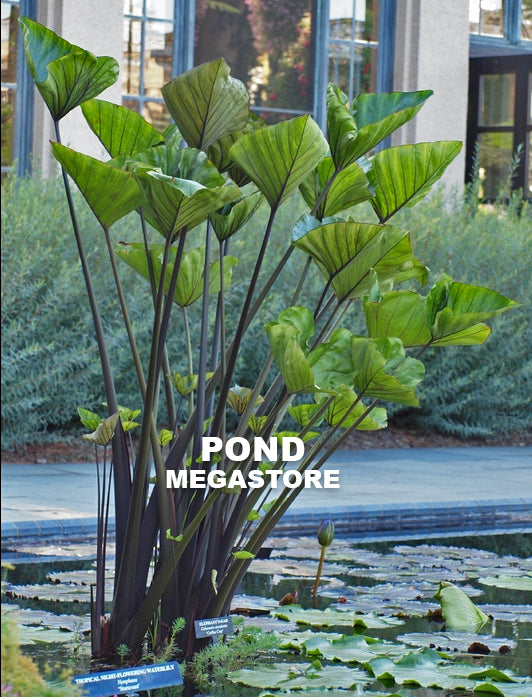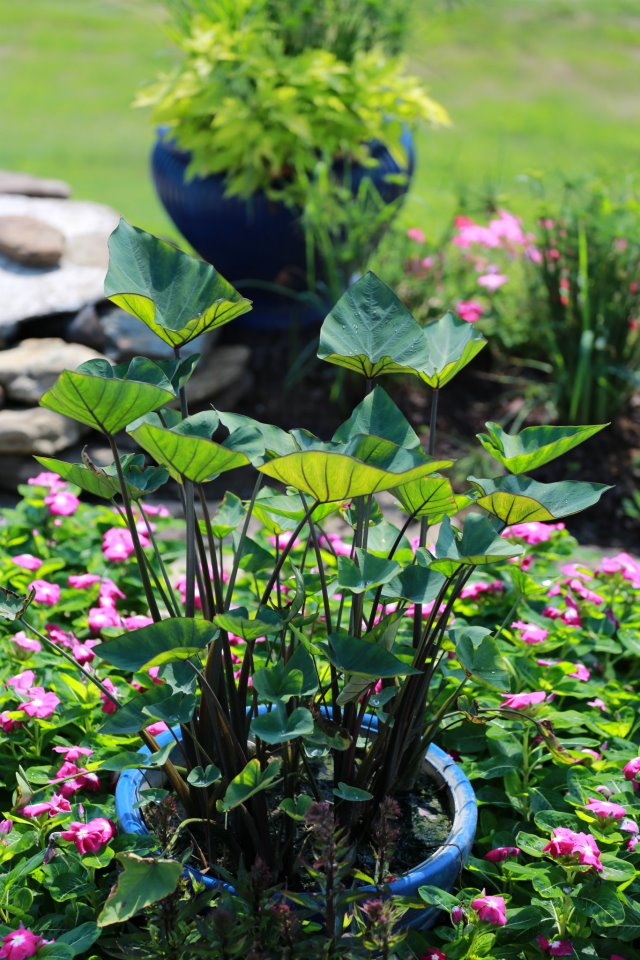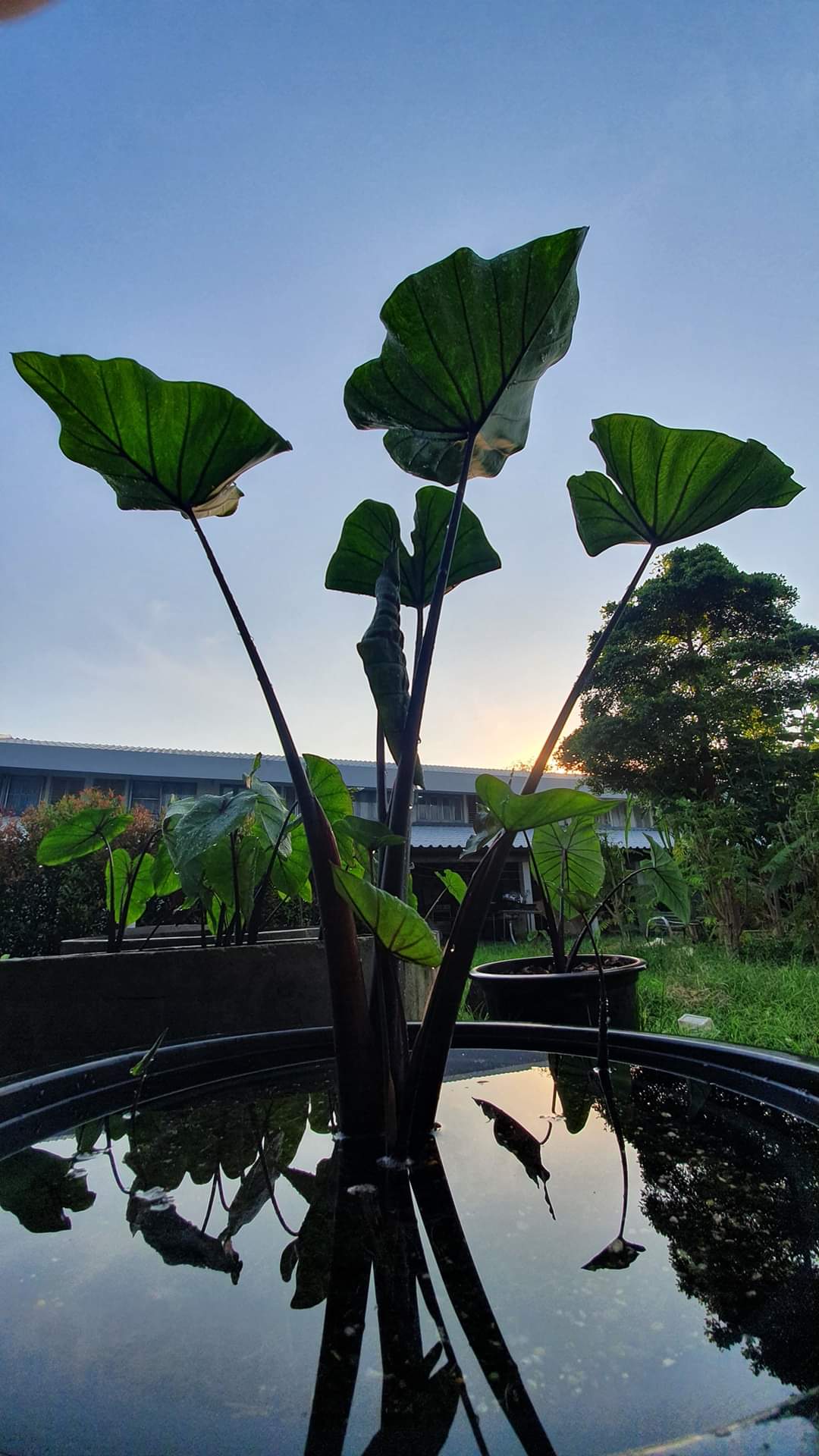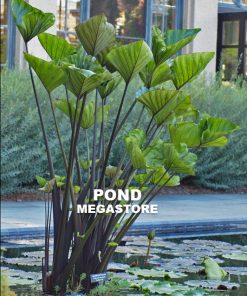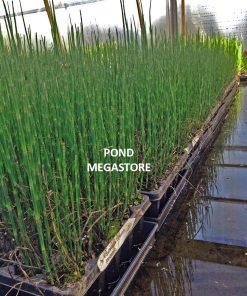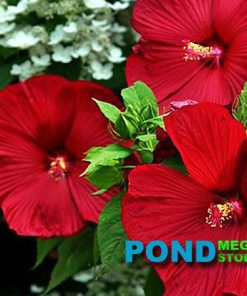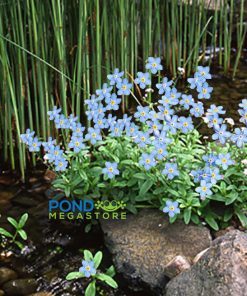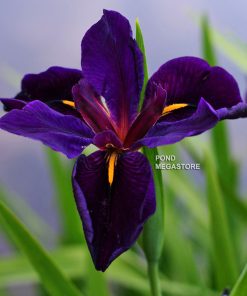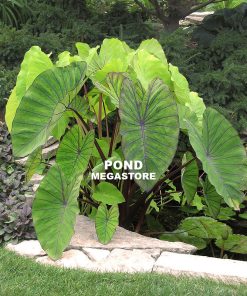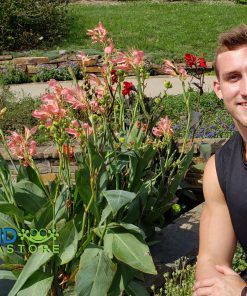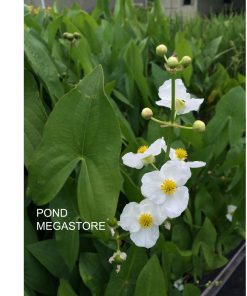Tea Cup Taro Teacup On Sale! Pond Megastore
$ 10,00 $ 6,00
Tea Cup Taro
Plant Description
Tea Cup Taro or Teacup Taro is a statuesque and stately plant in the landscape or in containers on your deck or patio! Beautifully shaped, glossy, green leaves are ‘cup’ shaped and look so very pretty! Tea cup Taro puts on a show rain or shine–Purple veining is spectacular when sun is shining through the leaves and cup shaped leaves fill up and pour out water when it is raining! Simply delightful! Tender bulbs can be planted in the landscape or in pots, using heavy loam soil, to add beauty to any area of your water garden feature. Glossy, dark-green, heart shaped leaves are showy! May be planted in containers and submerged in the pond and makes an excellent focal point! Tea Cup Taro can grow to 6 tall!
Height Grows 4 – 6 feet tall
Width 2 – 3 foot spread, over the summer months
Sunlight Requirements Part sun to part shade or full shade
Moisture Requirements Moist soil in the terrestrial garden or up to an inch of water over the top of the pot in the pond
Fertilize Once a month, June through August (Waterlily World Fertilizer Tabs in the pond)
Zone Hardy in zones 7 – 10b
Planting Instructions
Plant this lovely specimen in rich, moist, loamy soil after all danger of frost has passed. If planting in mass, space them 1 foot apart. If planting in containers for the pond, use heavy loam soil with some sand and submerge pot with up to 1 inch of water above the soil in the container. Grows well in part sun, part shade or full shade. In the north, lift bulbs after first light frost, remove foliage and remove excess soil from bulb, gently clean bulbs with water and allow to air dry in a well ventilated area outdoors for a week or two. Store bulbs in a cool, dark, dry area, indoors until spring, plant once all danger of frost has passed.
What Is Loam Soil?
Loam soil is a good mixture of Topsoil and Sand
If you are lucky enough to have good topsoil in your backyard, by all means, use your topsoil. All you will have to do is add fertilizer. If you are not so lucky–and your backyard is sand or heavy red or yellow clay, you can mix up a batch of loam soil.
You can create your own loam soil by mixing these two ingredients together
- 2/3 Inorganic Topsoil (Little or no organic material added)
- 1/3 Pool Filter Sand
Mix together thoroughly with a little water. Your soil should clump when squeezed. If your soil is mixed properly, it will not muddy your pond water.
You can purchase inexpensive bags of inexpensive / poor Topsoil at Lowes or Home-Depot. Good soil clumps together as a ball in your hand with only a little moisture.
Don’t buy brands like Scott’s or Miracle-Gro, as they will contain too much organic matter that can foul your water. Buy an unbranded bag of topsoil instead.
You can purchase Pool Filter Sand at any store that sells pool supplies.
Loam soil is well suited for all aquatic plants (except oxygenators). Oxygenators rarely need to be planted, just anchored in the substrate or in a container filled with sand or 1/8 inch pea gravel.
Sand holds little water but does allow for aeration and drainage.
Some DO’s and DON’TS regarding Aquatic Planting Soil
DO NOT use potting soils ( as they are too light and will float right out of the pot). Potting Soil has organic material that will rot and foul your water!
DO NOT add too much composted material (as it is too rich in organic matter and it will ferment underwater and destroy the ecology of your pond).
DO NOT use 100% calcined clay as there is no nutritional value in calcined clay.
DO NOT add rocks, stones or pebbles to the top of your planting container as this will inhibit the growth of your plants. Plants do not grow in rocks and stones in nature!
DO NOT purchase API Aquatic Planting Media or Microbe-lift Aquatic Planting Media as these products are NOT suitable for waterlilies, lotus or most other pond plants. They are suitable for submerged grasses ONLY!
Speedy Delivery and Professional Packaging
We can offer a variety of shipping options due to our long-term relationship with UPS FedEx DHL. Our warehouse staff are highly trained and will pack the items according to our exact and precise specifications. Your products will be subjected to an extensive inspection and be securely packaged before being delivered. We ship to hundreds of thousands of customers daily across various countries. This is an indication of our determination to become the largest online retailer worldwide. Warehouses and distribution centres can be located in Europe as well as in the USA.
Orders with more than one item are assigned processing periods according to each item.
Prior to shipment, we examine the items ordered carefully before shipping. Most orders are shipped within 48 hours. It is expected that delivery will take between 3 and 7 days.
Returns
We do not manage the stock in our factory and warehouse. So the actual stock may change at any time. Please be aware that it's possible that your order will run out of stock even after you have made the order.
Our policy runs for a period of 30 days. If thirty days have passed from the date you purchased the item, we cannot provide a refund or exchange.
The item must not be used, and it must be in the original packaging. You must have the item in the original packaging.
Related products
Marginals
Marginals
